|
In Their Own Words
How Teen and Pre-Teen Volunteering Abroad Develops Global Citizens
By Amy E. Robertson
6/18/2015 with 2/21/2024 resource updates by TransitionsAbroad.com
Adults have written eloquently about
why teens
should travel and the importance of service
to others. Volumes have been written about volunteer
vacations (I’ve
written plenty on the topic myself). Less often do we
have the opportunity to hear from youth participants themselves
about their experiences. I turned to two former international
volunteers, Mette Rousseau, 23, and
Zach Angerthal, 12, to find out what they had to
say.
Mette participated on a service trip
to Guatemala with Rotary International when
she was a high school junior. Her group comprised five students,
three members of the local Rotary club, and two trip leaders.
“Our group of ten partnered
with Hands
For Peacemaking in Barillas, Huehuetenango,
Guatemala. Our destination was the incredibly rural
community of Nuevo Santiago Esperanza Maya, a few
hours deeper into the mountains. We piled into the
back of a pick-up truck and knocked back and forth
on steep, rocky dirt trails. The project plans we
spent months preparing and only days executing were
(1) building a pig house, (2) planting a ‘Life
Garden,’ and (3) educating and installing water
filtration buckets in each household."
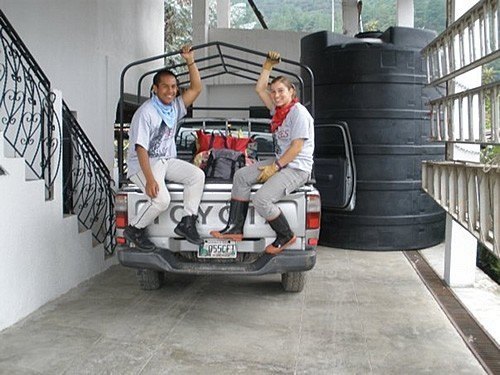
|
|
Loading up to ride into rural
Guatemala. Photo © Mette Rousseau.
|
To build the pig house we mixed
cement on the ground with hoes and shovels, and passed
buckets full down an assembly line staggered on a
steep bank. The house came together beautifully crafted
by men equipped with a few machetes, shovels, and
one old chainsaw.
Preparing the land for the Life
Garden was tiring work, but everyone had a part in
the process. Children pulled sticks and rocks from
the soil, grandmothers staked out rows, and everyone
dropped seeds in carefully planned sections. It was
an incredible transformation from bushes and tree
stumps to rich soil hand-plowed into neat rows. Weeks
later we received a picture of harvested crops piled
high on blue tarps.
After teaching the handful of
village leaders about the water bucket filtration
system, we divided into groups and walked the steep
trails to homes scattered about. Welcomed into the
humble homes, the village leader with each group would
explain to the family how to properly use and care
for their water filtration bucket, as well as the
many health benefits for using the buckets. Mothers
were impressed with the ability of this simple system
to clean their water and keep their children from
getting sick, something all too common for them. “
The volunteer selection and preparation
included a lengthy application process, weekly trainings,
and more than 80 hours of volunteer work before even
departing the U.S. As important as the preparation was
the long-term commitment that Rotary and its partner
Hands for Peacemaking have made to the community. “They
continued with the projects we began, but also added
multiple others such as clean stoves, fruit gardens,
and health and education programs,” says Mette. “The
long term partnering has been most impactful, and I am
thankful that I was able to have a short part in it.
The experience allowed me to be a part of a community
bigger than what I could see from my front door. I
remember most the smiles, and laughs, and way the children
warmed my heart. Maybe they remember the American pop
songs, or silly handshakes, and mad skills at basketball
we happily shared with them.”
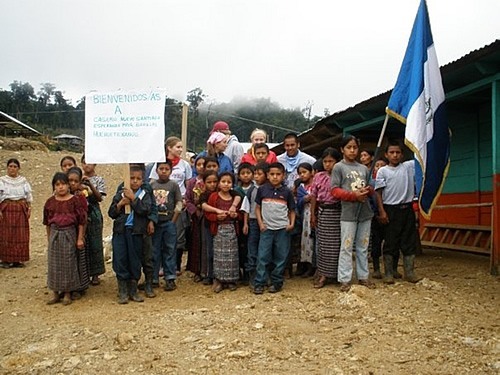
|
|
Mette Rousseau and her team
with community members of Nuevo Esperanza Santiago
Maya. Photo © Mette Rousseau.
|
Mette was left with more than just memories.
“If it weren’t for
this experience, my university studies would have
been drastically different. I attended Seattle Pacific
University and, greatly influenced by my trip to Guatemala
in 2009, I decided to study abroad for a quarter in
Guatemala studying Spanish, traveling to every corner
of the country I could reach and embracing the culture
I was living in. My university degree is in Global
Development Studies, Spanish and Geopolitics.”
The highlight of the trip was that it
marked the beginning of a passion and direction for Mette’s
future. What was the low?
“The shortness of the trip.
We only had a quick ten day taste of the country,
and only four days in the community completing projects.”
Like Mette, Zach Angerthal wishes he
could have spent more time volunteering.
Zach was just 11 when he participated
on his first international service trip. Together with his
mother, sister, three other students and a couple more parents,
Zach spent a week in El Salvador on a volunteer vacation
with Glasswing
International, an organization that integrates community
involvement, philanthropy and corporate responsibility in
its efforts to support marginalized communities.
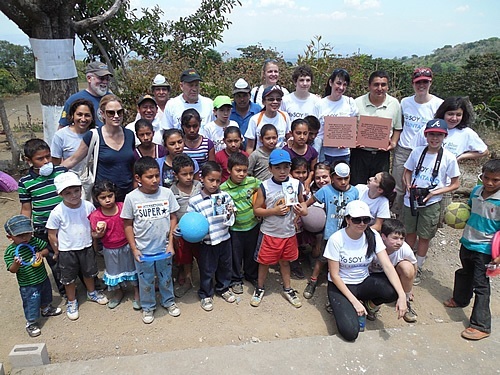
|
|
The Glasswing team poses with
community members for the dedication of the school
renovation. Photo © Kris Angerthal.
|
“It was a five day trip where we had three
days of work where we painted and refurnished/renovated
a school and then a clinic in need of help. Also,
we had two days of free time for ourselves where we
could hang out and do whatever we wanted.
One high for me was that we were involved with helping
schools, which if I were to do a voluntour, this would
be the exact topic I would choose. I like focusing
on helping kids' education in a way that I don't have
to actually be their teacher. A low thing for me was
that we had TWO whole days of free time. I like hanging
out and doing my own thing, but if I'm supposed to
be volunteering, than I've got to do that. Maybe the
organization could have cut down the vacation days
to just one.”
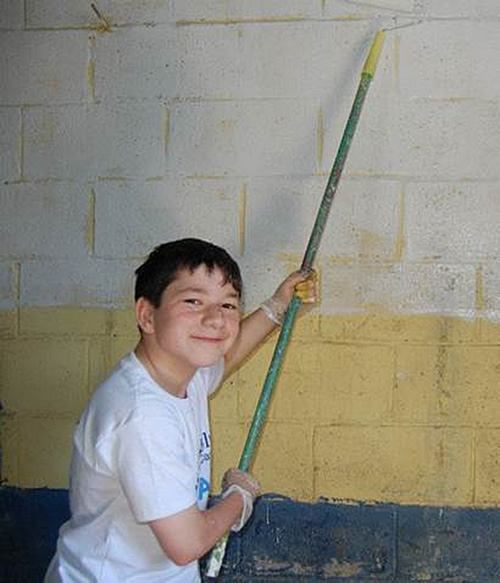
|
|
Zach paints the wall of the
local school. Photo © Kris Angerthal.
|
Zach and his family were stationed in
Ecuador for the past two years, and Zach has continued to
volunteer with disadvantaged children locally. Like Mette,
Zach has been inspired by these experiences, and recently
told his mother that he would like to lead voluntours when
he grows up.
“I felt that the voluntour
was a huge success and it made me feel proud of myself
for helping other kids that are more in need than
I am rather than helping myself. I think that the
people I helped gained knowledge and learned more
things, and I also think that people got healthier
because we patched up the small, local medical center
that is now well-known and more people go to it.
I also felt that I made a great
relationship with almost all of the people there and
I got to get to know them better. I also think that
the kids I helped gained a small friendship because
we became friends, but only for one day.
I learned that I should not care
about myself a lot and start caring for other people.
In my regular day life, I think I'm usually nice and
helpful to others, but voluntours ALWAYS make me feel
more helpful and caring. Another thing I learned was
that the harder I try, the faster something gets done
and the more efficient it gets done. What I would
like to do next, like right now, is to start volunteering
at more places so that not only will it make me feel
better, but I will also become more well-rounded and
more respected by others.”
Both Zach and Mette have valuable advice
to share. When asked how international volunteering can
be improved, Zach responded with “better organization.” Mette
answered by putting the responsibility back on the volunteer. “Books
have been written about the loaded question ‘How can
volunteering overseas be improved?’ but I think the
most impactful things an individual can do are (1) understand
development and aid, as well as a history for the particular
region and people they are visiting, and (2) take a deep
breath and dive in.”
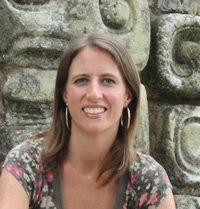
|
Amy E. Robertson has written many articles for TransitionsAbroad.com as Connected Traveler Contributing Editor.
She is the author of numerous publications for Moon Handbooks. Her writing has been published on NPR, Vice MUNCHIES, Budget Travel, Delta Sky, National Geographic Traveler, Wall Street Journal, Christian Science Monitor and Travel + Leisure, among others.
Amy has lived in six countries and traveled in more than 60.
Her volunteer experiences include building houses in Washington State and Honduras, monitoring presidential elections in Ecuador, working with youth on social documentaries in Bolivia, and serving lunch at soup kitchens in Seattle and Beirut.
Amy has a background in international development and nonprofit management and has worked in both the private and nonprofit sectors.
|
|
